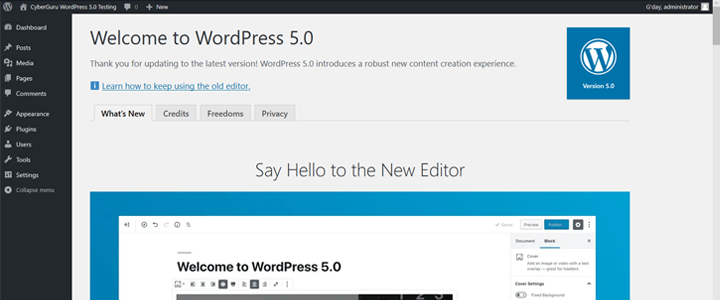
The latest version of WordPress, WordPress 5.0 ‘Bebo’ (known as “Gutenberg” during its development) has been released. For those unfamiliar, WordPress is a website content management system used by a majority of CyberGuru clients to build their websites. WordPress now powers 32% of the websites on the internet today, and in order to keep up with emerging trends, WordPress 5.0 has seen the largest upgrade to date on the platform.
Going from the current version of WordPress to the Gutenberg release is like changing from a manual car to an automatic. Just as an automatic car doesn’t look that different from a manual, websites in WordPress 5.0 won’t necessarily look vastly different from those using the current version of WordPress. However, the driving experience of automatic is substantially different from a manual and similarly the website design process is considerably more intuitive and user friendly in the Bebo release. Given the magnitude of this upgrade it is understandable that some plugins may not work and many websites may require tweaking to take full advantage of the upgrade.
The most significant change since the last major release some four years ago, is a block-based editor, similar to Divi and SiteOrigin Page Builder where editable content, such as text boxes, images and other items, can be added as simply as adding a block and modifying these. This is a large change from what was previously generally editing similar to a Word document. According to WordPress, they plan to continue to support the “Classic Editor” until at least 2021.
Another change is the frequency of updates. WordPress have proposed minor WordPress release twice a month. Further information is yet to be shared by WordPress, but we understand that these will be focused on improvements and bug fixes.
As it is nearly time here for Christmas (Summer) holidays, we recommend that our clients postpone upgrading until this can be reviewed closely in the new year. It is likely that there will be issues with possibly a theme, plugin or translation that may cause the upgrade to not go as planned. As with any new release, there is a likelihood of bugs and other issues to present itself themselves. It is anticipated that as an increasing number of websites begin to use the new version, these will be identified and resolved. Waiting until the new year will hopefully reduce the issues and be more stable and reliable.
We suggest having a working backup and testing the website prior to changing over to identify potential issues. We will be working with our clients to discuss how best to plan and manage this for their particular circumstances in the new year and identify a suitable time to upgrade.
We do not recommend taking this upgrade lightly. If you have any questions or require any further information, please contact us.


